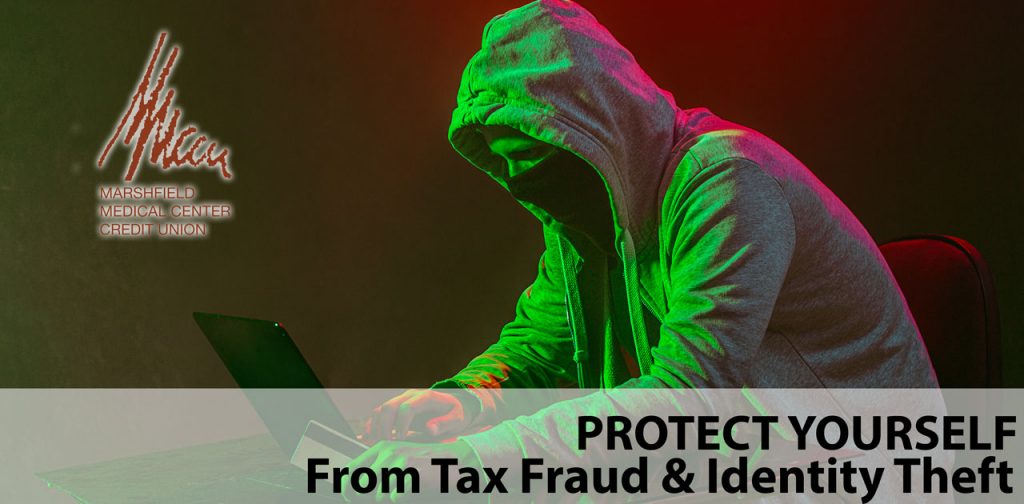Preventing Tax Fraud and Social Security Scams
With tax season well underway, preventing consumer fraud is especially important. Tax refund fraud focuses on using stolen ID information and is often run by complex criminal enterprises who have a full system in place to steal tax refunds. Protecting personal data online is something everyone needs to be cautious about.
“We want our members to be ever vigilant and maintain awareness of the financial risks that exist in our world,” said Carol Adler, President at Marshfield Medical Center Credit Union (MMCCU). “Right now – during the tax season—everyday someone is submitting a tax return and receiving a reject notification because someone else has filed a return in their name or using their social security number! It can and does happen and we want to provide our members with the resources to combat and respond to these events.”
Tax refund fraud happens, but you can lessen your exposure by following these tips the FTC offers to protect your information:
- Do not believe anyone who calls and claims to be from the IRS, Social Security or your local police department and then demands that you hand over personal information on the spot.
- Don’t verify the last four digits of your Social Security number, your bank account information or even your date of birth when someone is making demands.
- Pay attention to warning signs, such as the IRS notifying you that more than one tax return has been filed using your ID.
- An impostor may use aggressive phrases such as “please do not interrupt me while I am speaking.”
- Do not click on any links or attachments in suspicious emails.
- Protect your Social Security number throughout the year.
- Don’t leave tax return information out in the open or tucked in a backpack or briefcase that’s left in your car.
- File your tax return as early in the tax season as you can to beat ID thieves to the punch.
- Do not file your tax return from a coffee shop or other public area. Use a secure internet connection if you file electronically. If sending a paper form, mail your tax return directly from the post office.
- Research a tax preparer thoroughly before you hand over personal information.
- Check your credit report at least once a year for free at annualcreditreport.com. Make sure no one has opened a new account in your name.
“A person should notify the police (non-emergency) and the IRS if they are a victim of tax return fraud,” said Adler. “The IRS does have a remediation process for tax fraud victims. It is also smart for the individual to notify their financial institution so their account can be monitored and other resources made available. Knowledge is power.”
Tax fraud is most common this time of year, but Social Security scams are the most commonly reported type of fraud because they happen year-round, and according to the Social Security Administration’s Office of the Inspector General (OIG), continue to evolve.
Whether it’s scammers making fraudulent phone calls or sending falsified emails, criminals might demand arrest or legal action or might offer to increase benefits, protect assets, or resolve identity theft if given payment – and they are constantly adapting their attempts to be more convincing.
Here’s what you can do to protect yourself and others from Social Security scams:
- Ignore arrest threats. The Social Security Administration (SSA) will never threaten arrest or legal action if you don’t immediately pay a fine or fee. If you receive a call like this, it is a scam.
- Ignore emails and texts: If there is a legitimate problem with your SSN, the SSA will mail you a letter. They will not send emails or text messages.
- Watch for grammar mistakes and misspellings. A letter from the SSA might include government jargon or letterhead that appears official, but oftentimes will include grammar and spelling mistakes.
- Ignore requests for payment by gift card, cash, wire transfer, or pre-paid card. If the SSA asks for payment, they will mail a letter with payment instructions and options. Never pay a government fee or fine using gift cards, cash, internet currency, wire transfers, or pre-paid debit cards.
- Ignore promises to increase benefits in exchange for payment. The SAA will never promise to increase Social Security benefits or offer other assistance in exchange for payment.
If you think you have been a Social Security scam victim, report it to the Federal Trade Commission (FTC) immediately (FTC.gov/complaint) and to the SSA Office of Inspector General Fraud (Oig.ssa.gov).
Social Security scams are increasingly common, so staying vigilant and educated about these attempts is important.
Sources:
https://www.usatoday.com/story/money/2020/02/20/tax-refund-fraud-schemes-target-handlers/4807537002/
https://www.consumerfinance.gov/about-us/blog/five-ways-to-recognize-social-security-scam/

